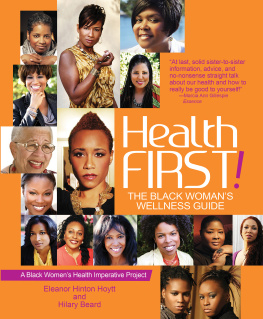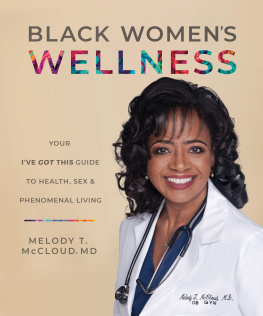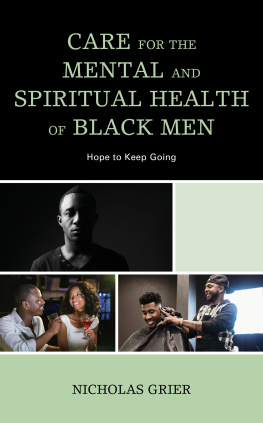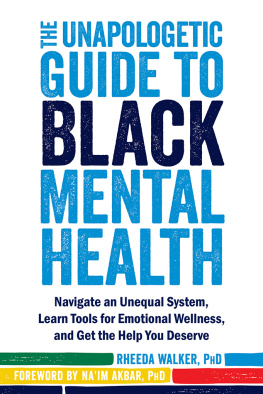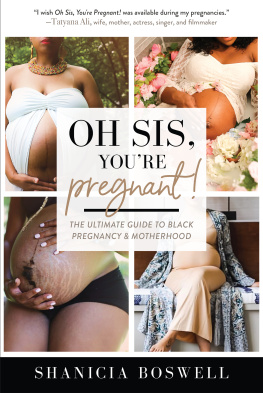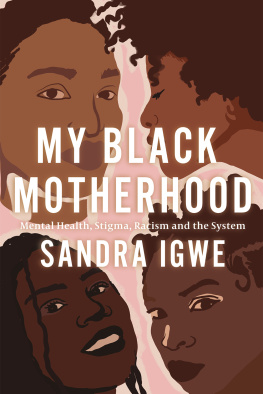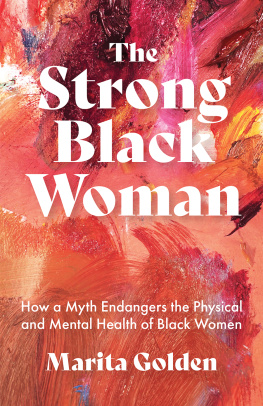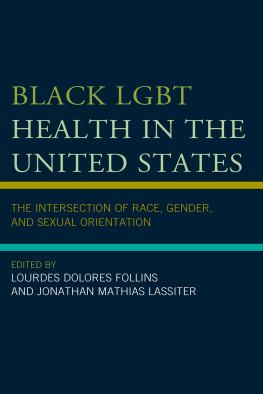
Where is Your Heart Leading You?
You were born with unique, undeniable gifts. In your quietest moments, you can feel them yearning to awaken.
You long to express them and show the world what youre truly capable of.
By discovering more about yourself, youll naturally understand how to fulfill the wonderful potential you know lives deep within you.
This self-discovery quiz will help guide you on your next steps to sharing your gifts with the world.
TAKE THE FREE QUIZ NOW >>


Copyright 2012 Black Womens Health Imperative
Published in the United States by:
SmileyBooks, 250 Park Avenue South, Suite #201, New York, NY 10003 www.SmileyBooks.com
The authors of this book do not dispense medical advice or prescribe the use of any technique as a form of treatment for physical, mental, or medical problems without the advice of a physician, either directly or indirectly. The intent of the authors is only to offer information of a general nature to help you in your quest for well being in body, mind and spirit. In the event you use any of the information in this book for yourself, which is your constitutional right, the authors and the publisher assume no responsibility for your actions.
Distributed in the United States by: Hay House, Inc.: www.hayhouse.com Published in Australia by: Hay House Australia Pty. Ltd.: www.hayhouse.com.au Published in the United Kingdom by: Hay House UK, Ltd.: www.hayhouse.co.uk Published in India by: Hay House Publishers India: www.hayhouse.co.in
Design: Cindy Shaw, CreativeDetails.net
Grateful acknowledgment is made to the following for their permission to reprint previously published material: American Obesity Association for the AOA Fact Sheet, Health Effects of Obesity.
Bertice Berry, Ph.D.: Excerpt from A Year to Wellness and Other Weight Loss Secrets, Freeman House Publishing 2011.
Gloria Wade-Gayles, Ph.D.: Excerpt from My Soul Is A Witness: African American Womens Spirituality, Boston:
Beacon Press 2002.
Terrie Williams: Excerpt From Stressed to Depressed. Reprinted with permission of Scribner, a Division of Simon & Schuster, Inc., from BLACK PAIN: It Just Looks like Were Not Hurting. Copyright 2008 by Terri Williams. All rights reserved.
Iyanla Vanzant: Excerpt from Saying Yes To Your Life. Copyright 2005 by Iyanla Vanzant. All rights reserved.
Excerpt from 10 Contemplations. Copyright 2002 by Iyanla Vanzant. All rights reserved.
All rights reserved. No part of this book may be reproduced by any mechanical, photographic, or electronic process, or in the form of a phonographic recording; nor may it be stored in a retrieval system, transmitted, or otherwise be copied for public or private useother than for fair use as brief quotations embodied in articles and reviewswithout prior written permission of the publisher.
The opinions set forth herein are those of the author, and do not necessarily express the views of the publisher or Hay House, Inc. or any of its affiliates.
Library of Congress Control Number: 2011942988
Tradepaper ISBN: 978-1-4019-3695-2
Digital ISBN: 978-1-4019-3696-9
To the fearless and faithful Black women
who started the National Black Womens
Health Project in 1983.
You taught us that the health and wellness
of Black WomenMATTERS.
Authors Note
Some names in this book have been changed to protect the privacy of those who graciously consented to share their experiences and life stories. We are grateful for their willingness to participate.
Founder, Black Womens Health Imperative
Magic. Thats how Ive come to describe that First National Conference on Black Womens Health at Spelman College that launched the National Black Womens Health Project in June 1983. When we put the word Black in front of Womens Health in the call to come together, something amazing happened. Over two thousand Black women came together to start conversations about topics previously thought unspeakable: emotional and sexual abuse, domestic violence, and abortion. We talked about becoming pregnant as teenagers and how being mothers too early meant being mothers for too long. We knew we had to take the risk of talking openly and honestly about things wed never talked about before. We simply knew that, in Fannie Lou Hamers famous words, we were sick and tired of being sick and tired. We knew that those words described our frustrations, our anguish, and our need to connect with other Black women who felt the same urgent drive to find the tools that would engage us in changing our lives.
This gatheringthe start of what would become the National Black Womens Health Projectgrew out of the collective consciousness of a nation itself in the grip of change: forced by the civil rights movement to face up to racial discrimination, by the womens movement to challenge gender discrimination, and by the womens health movement to push back against a medical system that treated its patients like children. Across the nation, women were moving from being passive receivers of care to being active participants, demanding reproductive rights, a demystification of medical care, and access to information about their own health.
In my work in Florida at the Gainesville Womens Health Center and Birthplace, a freestanding birthing center, I noted that while most white women used the preventative care services, few Black women did. Health conferences and meetings lacked Black womens perspectives, because we were not present in significant numbers. It occurred to me that we, Black women, had never had an opportunity to talk among ourselves about our health, our issues and concerns. We lived in isolation, not talking about the struggles we faced.
Back then most of us were unaware that we were snared in a conspiracy of silence, keeping ourselves victims of the oppression that racism, sexism, classism and homophobia fueled. Mistakenly believing that we somehow brought about the bad thingsrape, molestation, other forms of violencethat happened to us, we kept secrets and thought it was our business. What we did not understand was that our silence allowed the oppression not only to continue in our lives, but to persist into future generations. We needed a space where we could break the silence, a place to talk about our lives and learn about the lives of others in order to find the tools that would engage us in changing our lives.
Many of us confessed that chronic conditions were plaguing our bodies and that we had watched our families struggle to survive with diseases that access to good care could have prevented. Single mothers talked about the financial burden of rearing children alonesome due to absent fathers, some to incarceration by an unjust justice system, and others to low self esteem compounded by their communitys low expectations. We explored our relationships with our own mothers and fathers. Lesbians talked about being outcasts in their families, many choosing to live a closeted life, others taking the risk of being out. We worried about the examples we were setting for our children by remaining in dysfunctional marriages supposedly for their sake.
We confronted these burdens and fears head on, long before they became popular topics on daytime television. We learned that these issues were not our businessthey revealed our communitys systemic sexism and disregard for the lives of women. Many of us were angry at the world for slavery and other injustices. Some of us were angry at our families and many of us were angry at ourselves. These were difficult issues to grapple with. We persevered and made some of the changes we sought.
Next page
